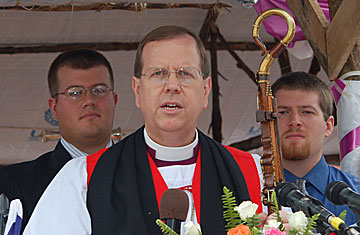
Bishop John Guernsey at a consecration ceremony in Mbarara, Uganda, Sptember, 2007
This Sunday a number of Episcopal churches in America will be praying under a distinctly foreign authority. God is still in charge, but so will the Church of Uganda. The east African nation's Anglican Church consecrated Virginian John Guernsey as bishop earlier this month to lead 33 American congregations that have defected from the U.S. Episcopal Church, mainly because of the American organization's stand of gay ordination — a stance reaffirmed at a conference this week in New Orleans.
But earlier in September, in a five-hour-long, open-air service in southwestern Uganda that blended Anglican hymns with traditional African music, bishops from around the world joined together to anoint the latest conservative U.S. cleric seeking shelter in an African church. Says Guernsey: "Uganda has become a haven for ecclesiastical refugees."
Wearing a slightly ill-suited printed Ugandan shirt, Bishop Guernsey earnestly called Uganda his "spiritual home." Guernsey is the most recent in a series of American bishops pledging allegiance to African churches that have strong anti-homosexuality stances. In September alone, Americans William Atwood and William Murdoch were also consecrated by an African church, the Anglican Church of Kenya. Anglicans worldwide have been divided since the U.S. Episcopal Church, the Anglican Church's American branch, consecrated Gene Robinson as Anglicanism's first openly gay bishop four years ago.
Anglican bishops met in Tanzania in February to issue an ultimatum to the U.S. church, calling for an end to both the appointment of gay clergy and the approval of same-sex unions. After a six-day meeting in New Orleans, American Episcopalians decided Wednesday that they will "exercise restraint" in doing both actions, but did not announce an end to its liberal position on homosexuality. The Episcopal Church also called for an end to the practice of foreign bishops consecrating Americans.
"The decision is inadequate — clearly, the Episcopal Church has torn apart the Anglican Communion and wants to walk away from the rest of the church," Guernsey says. "The Episcopal Church embarked on its course before there were African bishops and will continue to do so." He adds that American churches have become too dry and lost their vigor. In contrast, Guernsey says that Western visitors are often overwhelmed by the heightened religiosity found in Ugandan churches.
"Our church is attractive because of its intensity. It is lively and makes you feel at home," says Ugandan teacher Irene Muitta as she squints in the sun outside of All Saints' Cathedral, Kampala's most prominent Anglican institution. Evoking memories of Bible-thumping Puritans, the service includes impassioned personal testimonies; sweeping, cautionary tales against "evil" and rousing, eardrum-splitting singing.
All Saints' Cathedral is not grand — the building is rather small with hardly enough pews to seat its members. The white floor is constantly cleaned to sweep away Uganda's trademark orange mud. Yet several tents are erected each week around the cathedral to allow throngs of believers the chance to be included in the service via satellite screens. Casually perched on a fence near the cathedral's entrance, Ugandan development worker Chris Amwine gestures to the gathering crowd. Says Amwine, "This is how you're supposed to worship — we believe we should be together praying, not watching a service on television at home."
Not to mention, he proudly adds, the fact that Africa is at the forefront in the fight against homosexuality. "We're looking to the Church of Uganda for spiritual protection," Guernsey states when asked why American congregations are seeking leadership thousands of miles away. Guernsey says that he was part of the U.S. Episcopal Church for 29 years before he fled to Uganda in 2006. Much of the Anglican Church in Africa is opposed to the ordaining of gay priests and to same-sex unions. Many African countries have laws banning homosexuality altogether.
Some will wonder if a gaggle of congregations praying under the Church of Uganda will make any difference in the way Americans worship. U.S. Episcopalians represent a hugely wealthy segment of the Anglican communion, but they are declining in numbers. Uganda's Anglican church-attending population has boomed from 2.5 to 9.6 million over the past 30 years. The church in America, however, has had no discernible growth.
But Guernsey says that he wants to bring the vibrant Ugandan church atmosphere back to his All Saints' Church near Washington, D.C., and to other churches. The bishop leans forward and says conspiratorially, "It [the atmosphere] is contagious: You spread it through contact." It remains to be seen whether Americans in their Sunday best will start getting infected.
